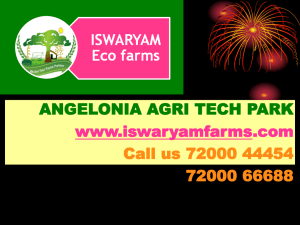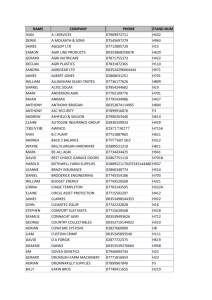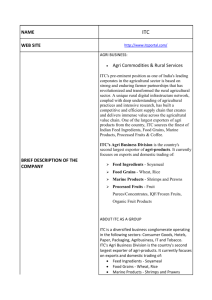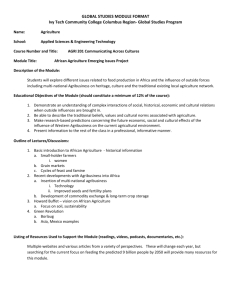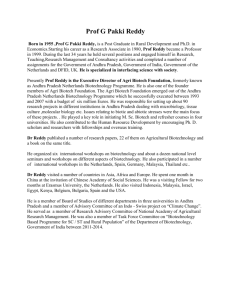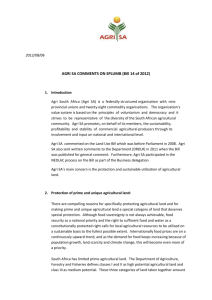Module Name - University of Mauritius
advertisement
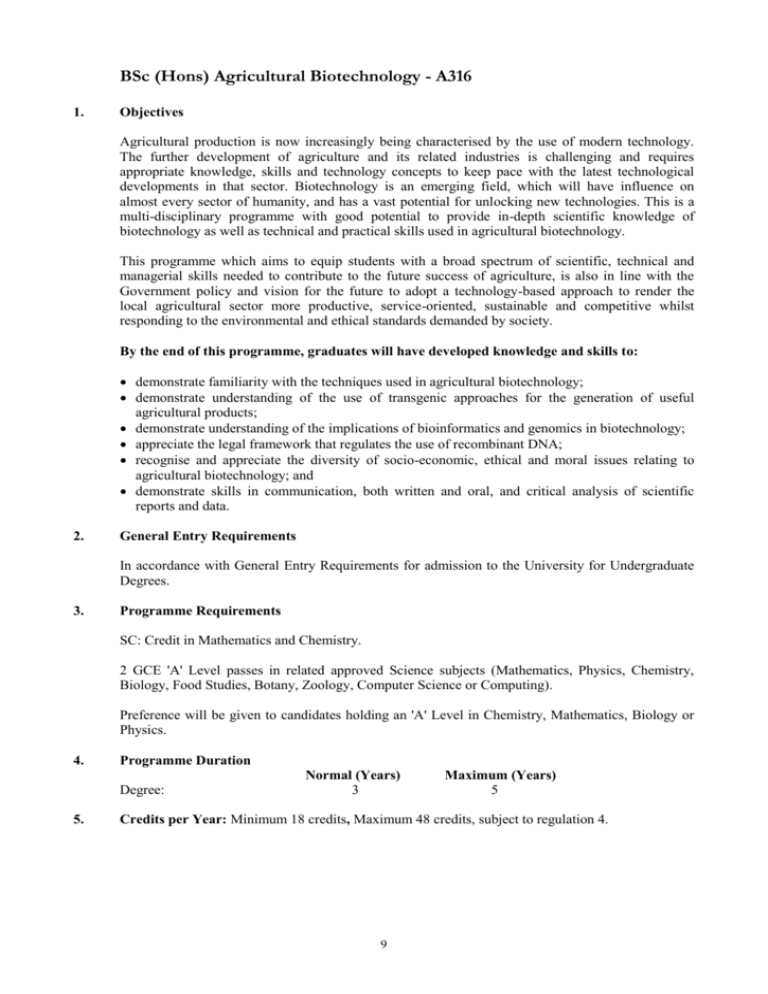
BSc (Hons) Agricultural Biotechnology - A316 1. Objectives Agricultural production is now increasingly being characterised by the use of modern technology. The further development of agriculture and its related industries is challenging and requires appropriate knowledge, skills and technology concepts to keep pace with the latest technological developments in that sector. Biotechnology is an emerging field, which will have influence on almost every sector of humanity, and has a vast potential for unlocking new technologies. This is a multi-disciplinary programme with good potential to provide in-depth scientific knowledge of biotechnology as well as technical and practical skills used in agricultural biotechnology. This programme which aims to equip students with a broad spectrum of scientific, technical and managerial skills needed to contribute to the future success of agriculture, is also in line with the Government policy and vision for the future to adopt a technology-based approach to render the local agricultural sector more productive, service-oriented, sustainable and competitive whilst responding to the environmental and ethical standards demanded by society. By the end of this programme, graduates will have developed knowledge and skills to: demonstrate familiarity with the techniques used in agricultural biotechnology; demonstrate understanding of the use of transgenic approaches for the generation of useful agricultural products; demonstrate understanding of the implications of bioinformatics and genomics in biotechnology; appreciate the legal framework that regulates the use of recombinant DNA; recognise and appreciate the diversity of socio-economic, ethical and moral issues relating to agricultural biotechnology; and demonstrate skills in communication, both written and oral, and critical analysis of scientific reports and data. 2. General Entry Requirements In accordance with General Entry Requirements for admission to the University for Undergraduate Degrees. 3. Programme Requirements SC: Credit in Mathematics and Chemistry. 2 GCE 'A' Level passes in related approved Science subjects (Mathematics, Physics, Chemistry, Biology, Food Studies, Botany, Zoology, Computer Science or Computing). Preference will be given to candidates holding an 'A' Level in Chemistry, Mathematics, Biology or Physics. 4. Programme Duration Degree: 5. Normal (Years) 3 Maximum (Years) 5 Credits per Year: Minimum 18 credits, Maximum 48 credits, subject to regulation 4. 9 6. Minimum Credits Required for Award of Undergraduate Degree: 105 Breakdown as follows: Degree Core Taught Modules 90 Credits from Project 9 GEMs 6 Students must complete at least one Practical Training satisfactorily for the award of the degree. Students may exit with (a) (b) 7. a Certificate after having earned 30 credits in core modules; a Diploma after having earned 60 credits in core modules. Assessment Each module will be assessed over 100 marks (i.e. expressed as %) with details as follows (unless otherwise specified): Assessment will be based on a Written Examination of 2-3 hour duration, carrying a weighting of 70%, and Continuous Assessment carrying 30% of total marks for AGRI modules. Modules from other Faculties/Departments/Centres will carry weighting in the Written Examination and the Continuous Assessment as specified by the concerned Faculties/Departments/Centres. Continuous Assessment will be based on laboratory/field works, and/or assignments, and should include at least 1 class test. A minimum of at least 30% should be attained in each of Continuous Assessment and Written Examination, with an overall total of 40% for a candidate to pass a module. Modules will carry the weightings of 1, 3 or 5 depending on their status (Introductory, Intermediate or Advanced). Weighting for a particular module is indicated within parentheses in the module code. Each module will carry 6 credits, except the Project, COMS 1010(1), CSE 1010e(1), AGRI 3004Y(5) and AGRI 3013Y(5). Project will carry 9 credits. Assessment of practical training will be based on supervisor’s report and student’s report. For satisfactory completion of the practical training, a minimum of 40% should be attained. Written examinations for all the modules will be carried out at the end of the year. 8. Important Note The rules as stipulated in this Programme Structure and Outline Syllabus will replace all other rules and regulations. 10 9. List of Modules CORE MODULES Code Module Name COMS 1010(1) CSE 1010e(1) AGRI 1002Y(1) AGRI 1006Y(1) AGRI 1007Y(1) AGRI 1008Y(1) AGRI 2006Y(3) AGRI 2007Y(3) AGRI 2008Y(3) AGRI 2009Y(3) AGRI 2010Y(3) AGRI 2011Y(3) AGRI 3000Y(5) AGRI 3005Y(5) AGRI 3006Y(5) AGRI 3007Y(5) AGRI 3008Y(5) AGRI 3013Y(5) AGRI 1000Y AGRI 2000Y Communication Skills Introduction to Information Technology Agricultural Botany and Plant Breeding Agricultural Chemistry and Biochemistry Crop Science and Production Animal Science and Production Statistics and Agricultural Experimentation Protein Biochemistry and Immunology Molecular and Cell Biology Cell and Tissue Culture Molecular Pathology and Pest Management Microbiology and Fermentation Technology Project GMOs, Biosafety and Bioethics Bioinformatics and Advances in Genomics Phytochemistry and Secondary Metabolites Current Topics in Agricultural Biotechnology Agribusiness and Entrepreneurship Practical Training* (Year 1) Practical Training* (Year 2) Hrs/Yr L+P D.E. O.E. 60+60 60+60 60+60 60+60 60+60 60+60 60+60 60+60 60+60 60+60 60+60 60+60 60+60 30+30 30+30 - Credits 3 3 6 6 6 6 6 6 6 6 6 6 9 6 6 6 3 3 - GEMs () 2 modules - 6 * Students must complete at least one Practical Training satisfactorily for the award of the degree. 11 10. Programme Plan – BSc (Hons) Agricultural Biotechnology YEAR 1 Code Module Name Hrs/Yr L+P Credits Communication Skills Introduction to Information Technology Agricultural Botany and Plant Breeding Agricultural Chemistry and Biochemistry Crop Science and Production Animal Science and Production Practical Training* (6-8 wks to be carried out after Year 1 exams) D.E. O.E. 60+60 60+60 60+60 60+60 - 3 3 6 6 6 6 - Module Name Hrs/Yr L+P Credits Statistics and Agricultural Experimentation Protein Biochemistry and Immunology Molecular and Cell Biology Cell and Tissue Culture Molecular Pathology and Pest Management Microbiology and Fermentation Technology Practical Training* (6-8 wks to be carried out after Year 2 exams) 60+60 60+60 60+60 60+60 60+60 60+60 - 6 6 6 6 6 6 - Module Name Hrs/Yr L+P Credits Project GMOs, Biosafety and Bioethics Bioinformatics and Advances in Genomics Phytochemistry and Secondary Metabolites Current Topics in Agricultural Biotechnology Agribusiness and Entrepreneurship 60+60 60+60 60+60 30+30 30+30 9 6 6 6 3 3 - 6 CORE COMS 1010(1) CSE 1010e(1) AGRI 1002Y(1) AGRI 1006Y(1) AGRI 1007Y(1) AGRI 1008Y(1) AGRI 1000Y YEAR 2 Code CORE AGRI 2006Y(3) AGRI 2007Y(3) AGRI 2008Y(3) AGRI 2009Y(3) AGRI 2010Y(3) AGRI 2011Y(3) AGRI 2000Y YEAR 3 Code CORE AGRI 3000Y(5) AGRI 3005Y(5) AGRI 3006Y(5) AGRI 3007Y(5) AGRI 3008Y(5) AGRI 3013Y(5) GEMs () (2 Modules) TOTAL NUMBER OF CREDITS: 105 * Students must complete at least one Practical Training satisfactorily for the award of the degree. 12 11. Outline Syllabus COMS 1010(1) - COMMUNICATION SKILLS Writing skills, non-verbal communication, modes of speech delivery and presentation aids, speeches, perception and listening skills, business and technical writing. CSE 1010e(1) - INTRODUCTION TO INFORMATION TECHNOLOGY IT and Computers; Stepping in the Computer; Input and Output Devices; Secondary Storage; Programming; Systems Software; Applications Software; Systems Development; Computer Networks; The internet; Computer Security; Software Utilities; Issues and Trends in IT. AGRI 1002Y(1) - AGRICULTURAL BOTANY AND PLANT BREEDING Classification, identification, morphology, ecology and uses of economically important crops. Microbial diversity, structure, function and economic significance. Mendelian inheritance. Linkage and chromosome mapping. Sex linked and extranuclear inheritance. Quantitative and population genetics. Objectives of plant breeding. Selection techniques. Methods of crop improvement. Genetic variation and manipulation of variability. Breeding of selected crops. Legislative framework. Plant biodiversity. AGRI 1006Y(1) - AGRICULTURAL CHEMISTRY AND BIOCHEMISTRY Soil as a natural body. Soil profile. Soil properties. Concepts of soil fertility and land suitability. Manures and fertilisers. Agrochemicals, their properties, metabolism, and mode of action. Structure and functions of cells and organelles; Biomolecules: polysaccharides, sugars; storage polysaccharides; Lipids, classification and properties, biological membranes; Proteins, amino acids, covalent and three-D structure of proteins; Enzymes, properties and mechanism of actions, enzyme kinetics; Metabolic pathways, thermodynamics, Energy metabolism: pathways respiration and ATP synthesis. Photosynthesis. Nucleic acids and protein synthesis. Classification, chemical structure and properties of food constituents and food additives. Primary sensory attributes of food and perception of food quality. AGRI 1007Y(1) - CROP SCIENCE AND PRODUCTION Principles of agronomy. Crop-environment interactions. Crop physiology. Crop propagation. Cropping systems. Field operations and techniques in crop production. Flowering and reproductive physiology. Plant bioregulators. Yield determination and crop productivity. Field crop agronomy. Husbandry and production of vegetables, fruits and ornamentals. Principles and practices of seed production. Nutrient requirements and fertiliser recommendations for specific crops/cropping systems. Soil fertility management. Fertiliser application technologies. Biological techniques for sustainable production. AGRI 1008Y(1) - ANIMAL SCIENCE AND PRODUCTION Aspects of physiological processes in growth, development, digestion, reproduction, lactation, egg laying. Meat science: carcass composition and quality. Effect of climatic factors on metabolism, growth health and disease resistance. Genetic and physiological adaptation to the environment. Disease causing agents. Pests and diseases of farm animals. Natural and acquired immunity. Use and control of drugs. Public health and diseases. Animal health schemes. Principles of managing animals in typical production systems for biological and economic sustainability: poultry (meat, eggs, other avian species); pigs; rabbits; deer; goats and sheep; beef and dairy cows. Introduction to exotic animal species. Food chain management from primary production to consumer use. Management of disease risks. Trends and current issues related to production and consumption of animal products: meeting the needs of a global market and public concerns. Faunal biodiversity. AGRI 2006Y(3) - STATISTICS AND AGRICULTURAL EXPERIMENTATION Introducing statistics in agriculture. Descriptive statistics – summarising and displaying data. Probability distributions. Point and Interval Estimation. Hypothesis testing. Analysis of categorical data. Regression analysis. Data entry and analysis using EXCEL & SPSS. Introduction to Scientific and Technical Writing. Elements of Research Methodology. Introduction to qualitative research. Sampling and questionnaire design. Planning research surveys/experiments. Sampling methods. Design and analysis of experiments. Statistical computing practices using EXCEL & SPSS. 13 AGRI 2007Y(3) - PROTEIN BIOCHEMISTRY AND IMMUNOLOGY Techniques for isolation and characterisation of proteins; column chromatography; electrophoresis; blots; cells and tissues of the immune system; immunological reactions to infections; genetic basis of antibody production; vaccines and immunity. Immunochemical techniques. AGRI 2008Y(3) - MOLECULAR AND CELL BIOLOGY Cellular organisations. Cell metabolism. Energetics. Cell surface & cytoplasmic organelles. Phenotype, genes and alleles. Chromosomes and the cell cycle. Properties of DNA. Recombination. Genetic engineering. The basic concept of DNA cloning. DNA cloning vectors. DNA repair. Mutation and mutagenesis. DNA sequencing. AGRI 2009Y(3) - CELL AND TISSUE CULTURE Principles of plant micropropagation; The totipotency concept; Role & composition of plant tissue culture media; Micropropagation pathways; Callus induction & culture; Meristem culture; Haploid production; Cryopreservation and germplasm storage; Artificial seed technology; Embryo rescue; Protoplast culture & Somatic hybridisation; Variation in plant tissue cultures. Animal cell culture techniques and applications. AGRI 2010Y(3) - MOLECULAR PATHOLOGY AND PEST MANAGEMENT Identification and characterisation of plant and animal pathogens. Molecular Virology: classification, isolation and evolution of viruses. Biochemical and molecular methods for studying bacterial and fungal pathogens. The application of molecular biology in disease control. Genetic diversity of microorganisms. Biological control of pests. Genetic control of pests. The study and application of molecular and biotechnological methods for pest control. Biotechnological perspectives in chemical ecology of pests. Hormone-mediated gene expression of insecticidal proteins. Role of biotechnology in IPM. Case studies. AGRI 2011Y(3) - MICROBIOLOGY AND FERMENTATION TECHNOLOGY Bioreactor design and operation, media composition, rheology, gas exchange and mass transfer, sterilisation, bioreactor scale-up. Process engineering and instrumentation. Production and commercial applications of industrial products. Downstream processing and product purification. Microbial diversity; cell structure; life cycles. Classification of microbes. Growth habits. Biochemical assays of microbes. AGRI 3000Y(5) - PROJECT This is a very important component of the programme, allowing students to develop high level skills and cognitive abilities. Every student will be allocated a research topic and the research work will be carried out under supervision. The student will have to submit a dissertation not exceeding 40 pages from “Introduction” to “Conclusion”. Students should demonstrate good practice in using skills and knowledge acquired and follow guidelines as laid down. AGRI 3005Y(5) - GMOs, BIOSAFETY AND BIOETHICS Ethical issues in biotechnology. Biosafety and risk assessment of GMOs. Public perception. IPR and trade related aspects. Methods for producing transgenic plants and animals. Important genes of agronomic interest. Current trends in finding useful genes. GMO Act 2004. Traceability. Legislative aspects. AGRI 3006Y(5) - BIOINFORMATICS AND ADVANCES IN GENOMICS Genomics and gene function. Computational fundamentals in bioinformatics. Modelling and molecular dynamics of biomolecular systems. Methods in Bioinfomatics. Phylogenetics. Knowledge based systems in Bioinformatics. The use of molecular markers to varietal differentiation and breeding. AGRI 3007Y(5) - PHYTOCHEMISTRY AND SECONDARY METABOLITES Compounds of plant secondary metabolism; Biosynthetic pathways for secondary products; Commercial importance of secondary metabolites; Extraction and purification of plant secondary products; Phytochemical screening and characterisation of plant secondary products; Bioactivity of plant secondary products; Growth and secondary metabolite accumulation patterns by cell cultures; Optimisation methods for secondary metabolite production by plant cell cultures; Immobilisation and Elicitation. 14 AGRI 3008Y(5) - CURRENT TOPICS IN AGRICULTURAL BIOTECHNOLOGY Current topics in the scientific literature and the media on agricultural biotechnology. New approaches to breeding. Embryo transfer & technology. Cloning and transgenic animals. Use of gene technologies in animal breeding. AGRI 3013Y(5) - AGRIBUSINESS AND ENTREPRENEURSHIP Types of business organisations. Agribusiness finance. Investment appraisal. Business environment. Characteristics of small and medium agribusinesses. Public and private organisations facilitating the setting up of an agribusiness in Mauritius. Setting up of an agribusiness unit and development of a business plan. Marketing strategies for an agribusiness. Case studies. Entrepreneurship: generation of business ideas and innovation. Clustering. Incubators. Regional outlook. 15 16
